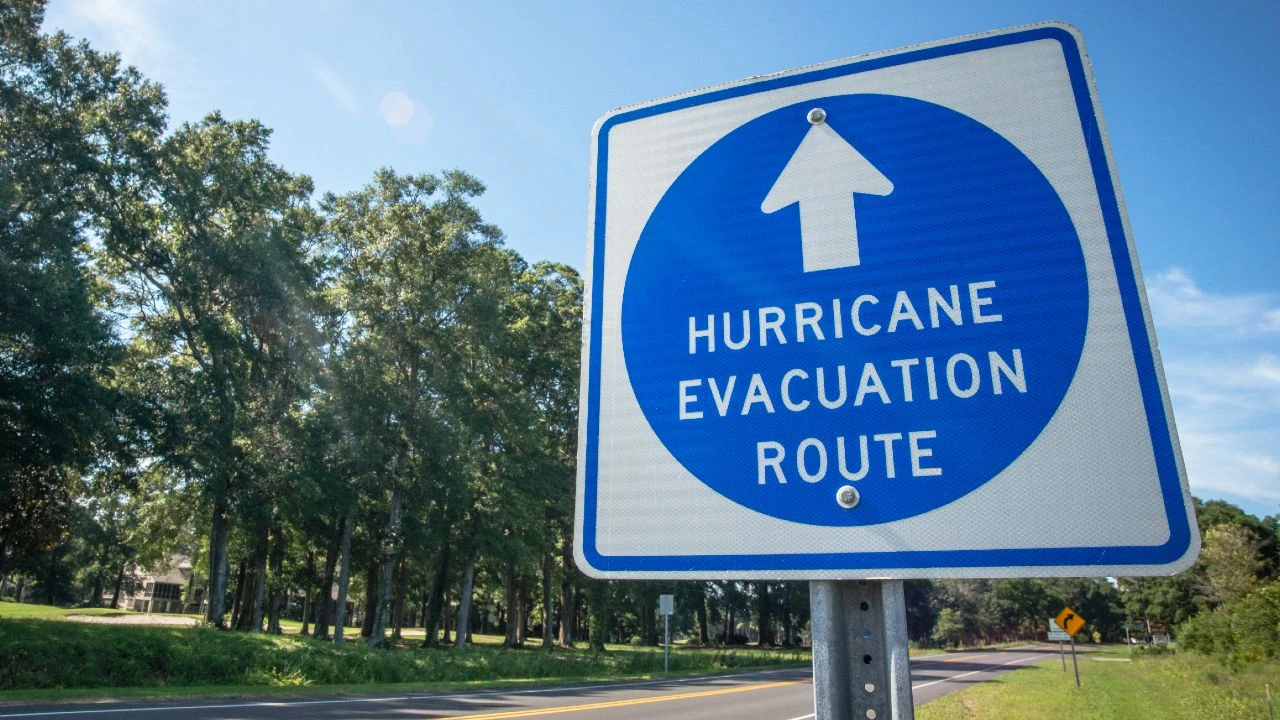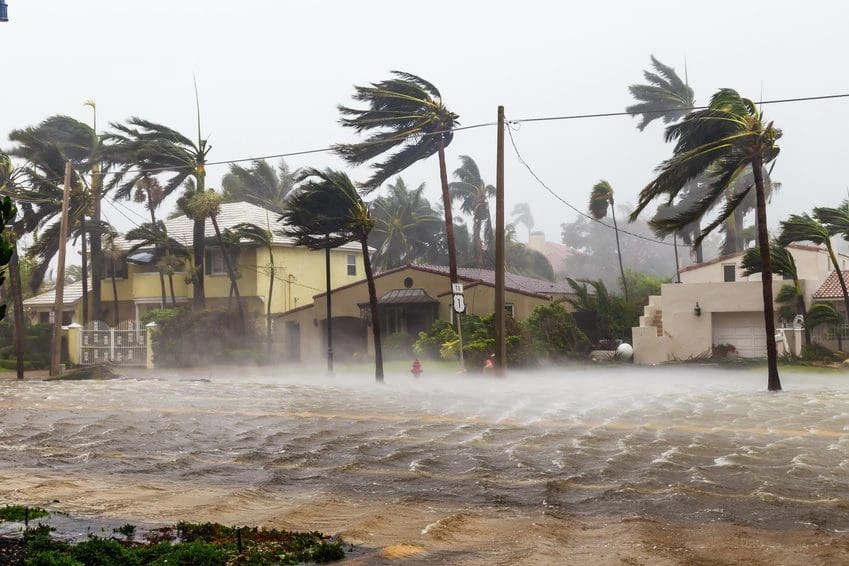Buying in a Hurricane Zone
Published on October 4, 2024 | 8 Minute read

Melanie
Ortiz Reyes
Content Specialist
Purchasing a home is a significant milestone in anyone's life, but when you're considering property in a hurricane-prone area, there's an extra layer of complexity to navigate. From Florida's sun-soaked coasts to the scenic shores of the Carolinas, many desirable locations come with the risk of tropical storms and hurricanes. This guide will walk you through the factors to consider before making your dream coastal home a reality.

Understanding Hurricane Zones
First things first: what exactly is a hurricane zone? Generally speaking, hurricane zones are coastal areas along the Atlantic Ocean and Gulf of Mexico that are most susceptible to tropical cyclones. These regions include states like Florida, Louisiana, Texas, and the Carolinas, as well as parts of Georgia, Alabama, and Mississippi. However, the effects of hurricanes can reach far inland, so it's crucial to understand the specific risks of your chosen location.
The Atlantic hurricane season officially runs from June 1 to November 30, with peak activity typically occurring between August and October. During this time, residents in hurricane-prone areas need to be particularly vigilant and prepared for potential storms.
Assessing the Risk
When buying a house in a hurricane zone, the old real estate adage of "location, location, location" takes on new meaning. Here are some key factors to consider:
1. Proximity to the coast: Generally, the closer you are to the shoreline, the higher your risk of hurricane damage. However, don't assume that being further inland completely eliminates the risk.
2. Elevation: Low-lying areas are more susceptible to storm surge and flooding. Consider the property's elevation above sea level and its flood zone designation.
3. Surrounding landscape: Natural barriers like dunes or mangroves can offer some protection against storm surge. Conversely, nearby water bodies might increase flood risk.
4. Local infrastructure: How well-equipped is the area to handle hurricanes? Look into the quality of drainage systems, seawalls, and evacuation routes.
5. Historical storm data: Research the area's hurricane history. Has it been hit frequently? How severe were past storms?
Building Codes and Construction
In hurricane-prone areas, the construction of your home can make a significant difference in its ability to withstand storms. Here's what to look for:
1. Hurricane-resistant features: These might include impact-resistant windows, reinforced doors, hurricane straps connecting the roof to the walls, and a hip roof design that's less likely to be damaged by high winds.
2. Building materials: Concrete block construction is often more resilient than wood frame houses in hurricane conditions.
3. Compliance with local building codes: Ensure the home meets or exceeds current building codes for hurricane resistance. Many coastal areas have updated their codes following major storms.
4. Age of the property: Newer homes are more likely to incorporate modern hurricane-resistant features. If you're considering an older home, factor in the cost of potential upgrades.
5. Roof condition: The roof is particularly vulnerable during hurricanes. Check its age, condition, and whether it's designed to withstand high winds.
Insurance Considerations
Insurance is a critical consideration when buying in a hurricane zone. Standard homeowners insurance often doesn't cover flood damage, which is a significant risk during hurricanes. Here's what you need to know:
1. Flood insurance: If you're in a high-risk flood zone, your mortgage lender will likely require flood insurance. Even if it's not required, it's worth considering.
2. Wind coverage: Some standard policies exclude wind damage in hurricane-prone areas. You may need a separate wind policy or a hurricane rider.
3. Insurance costs: Premiums in hurricane-prone areas can be significantly higher. Get quotes from multiple insurers to understand the potential costs.
4. Coverage limits: Make sure you understand what is and isn't covered. For example, some policies may not cover outdoor structures or landscaping.
5. Deductibles: Hurricane deductibles are often higher than standard deductibles and may be a percentage of your home's insured value rather than a fixed amount.
6. Claims history: If the home has a history of hurricane-related claims, it could affect your ability to get insurance or the cost of coverage.

Living in a Hurricane Zone
Beyond the structural and financial aspects, living in a hurricane zone comes with unique lifestyle considerations:
1. Emergency preparedness: You'll need to be ready to evacuate on short notice. This includes having an emergency kit, important documents easily accessible, and a clear evacuation plan.
2. Storm shutters or plywood: If the home doesn't have built-in storm protection for windows and doors, you'll need to be prepared to install temporary protection before a storm.
3. Generator: Power outages are common during and after hurricanes. A backup generator can be a valuable investment.
4. Landscaping: Choose native plants that are more resistant to high winds and saltwater. Avoid trees that could potentially fall on your home during a storm.
5. Storage: Consider where you'll store outdoor furniture, grills, and other items that could become projectiles during high winds.
6. Community resources: Research local emergency services, shelters, and community support systems for hurricane events.
The Financial Picture
Buying a home in a hurricane zone can come with additional expenses that might not be immediately apparent:
1. Higher maintenance costs: Salt air and humidity can accelerate wear and tear on your home, leading to more frequent maintenance and repairs.
2. Potential for special assessments: If you're buying in a condo or homeowners association, be aware that major storm damage could lead to special assessments to cover repairs.
3. Impact on resale value: While coastal properties often appreciate well, the increasing frequency and severity of hurricanes could impact future resale values.
4. Renovation restrictions: If you're planning to renovate, be aware that there may be stricter building codes and permit requirements in hurricane-prone areas.
5. Tax implications: Some states offer tax deductions for hurricane preparedness expenses or for installing hurricane-resistant features.
Climate Change Considerations
As you consider buying in a hurricane zone, it's important to factor in the potential impacts of climate change:
1. Sea level rise: Coastal areas are particularly vulnerable to rising sea levels, which can exacerbate flooding during storms.
2. Changing storm patterns: Some research suggests that climate change could lead to more intense hurricanes, though not necessarily more frequent ones.
3. Insurance implications: As risks increase, insurance costs may rise, and coverage may become more difficult to obtain in some areas.
4. Long-term property value: Consider how climate change projections might affect the long-term value and livability of the property.

Weighing the Pros and Cons
After considering all these factors, you might be wondering if buying in a hurricane zone is worth it. Like any major decision, it comes down to weighing the risks against the rewards:
Pros:
- Beautiful coastal locations
- Potential for strong property appreciation
- Access to beach lifestyles and water activities
- Warm climates year-round in many hurricane-prone areas
Cons:
- Risk of property damage or loss from hurricanes
- Higher insurance and maintenance costs
- Potential need for evacuation during storm threats
- Possible long-term impacts from climate change
Ultimately, many people find that the benefits of living in these beautiful coastal areas outweigh the risks. With proper preparation, a well-constructed home, and adequate insurance coverage, you can mitigate many of the challenges associated with hurricane zones.
Making an Informed Decision
Buying a house in a hurricane zone requires careful consideration and thorough research. From understanding the specific risks of your chosen location to ensuring your home is built to withstand storms, there's a lot to think about. However, with the right preparation and mindset, you can enjoy the many benefits of coastal living while minimizing the risks.
Remember, knowledge is power when it comes to hurricane preparedness. Stay informed about local weather patterns, invest in necessary home improvements, and always have an emergency plan in place. By doing so, you'll be well-equipped to handle whatever mother nature throws your way, allowing you to fully enjoy your slice of coastal paradise.
Whether you're drawn to the sugar-sand beaches of Florida, the charming coastal towns of the Carolinas, or the vibrant Gulf Coast, buying a home in a hurricane zone can be a rewarding experience. Just be sure to go into the process with your eyes wide open, armed with the knowledge to make the best decision for you and your family.